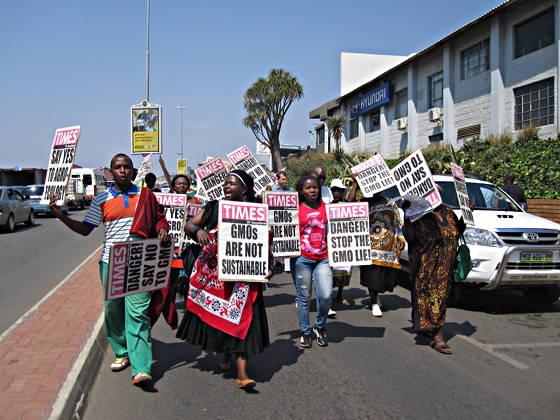Latest Resources

1 November 2018
Demystifying GM maize through collective action on World Food Day
In an effort to highlight the complex and concentrated South African agricultural and food system, with its unsustainable and deepening inequality, the African Centre for Biodiversity (ACB) and partner organisations initiated a “no GMO-maize campaign” earlier in 2018. This was followed up in August 2018, with a meeting of organisations that included Zingisa, Ntinga Ntaba […]

16 July 2018
Marginalised worldviews hold the key to climate change adaption: Reflections from the Internation...
June 2018 In the climate change arena there are two main streams of work – mitigation, which are measures we need to take to stop emissions and halt climate change, and adaptation – the varied practices we are taking and can take to adapt to living with the new conditions that climate change brings. Adaptation […]

18 June 2018
Agroecology points the way towards resilience against climate change
This week the water-stressed city of Cape Town hosts the bi-annual Adaptation Futures conference, where scientists, business leaders, and practitioners from the world of development and agriculture will come together to engage in ‘dialogues for solutions’ to the multifarious problems wrought by our rapidly changing climate. As actors with different perspectives design modes of collaboration, […]

14 June 2018
Restrict, regulate and reduce corporate power in South Africa’s food system
I attended a dialogue on corporate ownership in South Africa in May, in Tshwane, hosted by Trade and Industrial Policy Strategies (TIPS). There was strong government representation at the dialogue, including from Treasury; Trade and Industry; Minerals and Energy; and Planning, Monitoring and Evaluation. Someone from the EU was also there. Corporate concentration is a […]

6 June 2018
Bayer opposes black economic empowerment in purchase of Monsanto
The Competition Tribunal announced the finalisation of the merger between Bayer and Monsanto in South Africa in May. Bayer had taken the original conditions imposed by the Competition Commission in 2017 to the Tribunal for reassessment. These included selling businesses to black economic empowerment (BEE) compliant companies. Bayer has claimed confidentiality on the conditions, making […]

4 June 2018
The debate on GMOs in Africa rages on, this time in Tanzania
A heated public debate on genetically modified organisms (GMOs) ensued during a seminar organised by MVIWATA – a network of smallholder farmers – in Morogoro, Tanzania. The meeting took place on 12 May 2018 and was attended by more than a hundred people, including parliamentarians and high-level government officials. The event, which was intended only […]

28 May 2018
Biosafety Indaba eSwatini: Unclear motives following approval to cultivate Bt cotton, despite dis...
The news that the Swaziland Environmental Authority (SEA) had authorised the importation and commercial release of Bt cotton seeds came as a huge shock to the African Centre for Biodiversity (ACB). It meant that ACB had to reconsider its earlier acceptance of an invitation by SEA to attend a National Biosafety Indaba on 22 May […]

18 October 2017
The GMO crisis in Swaziland
Swaziland is under enormous pressure to introduce genetically modified organisms (GMOs) into the country’s farming system. This pressure is coming not only from Monsanto but also from farmers and some sections of the public who have been fed a great deal of misinformation and hype by the pro-biotech machinery. The farmers, acting on incomplete and […]

16 October 2017
Is transformation on the Horizon?
Someone asked my son when he was about three years old, ‘What is your father’s job?’ He said, ‘Sibseba’, which in Amharic means ‘meetings’. This was because every time my son used to ask me where I was going, I used to tell him to sibseba. At the time, I was coordinating the Ethiopian civil […]

19 September 2017
Erosion of farmers’ seed and agricultural systems in Tanzania
There are no simple answers when it comes to predicting the future of African food systems. Across the continent, the push to commercialise African agriculture to feed the growing and urbanising population, increase incomes, and reduce poverty is well known. However, this ‘solution’ is also heavily criticised for its ineffective, inappropriate and misdirected approach for […]
